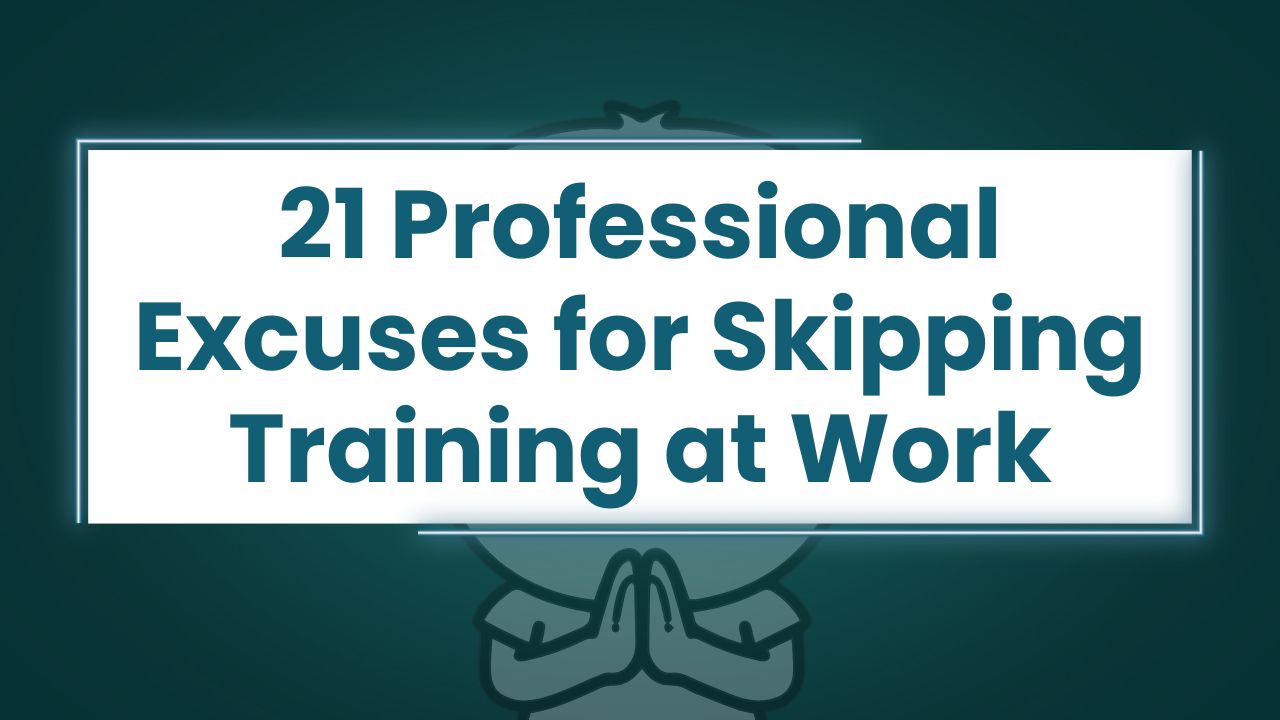Let’s be honest—not all workplace training sessions fit into your schedule. Whether you’re juggling deadlines, dealing with client meetings, or managing personal issues, missing a training session doesn’t mean you’re unprofessional. You just need a valid and respectful reason.
You’ll discover 21 professional excuses for skipping training at work—all crafted to sound polite, believable, and appropriate in a corporate setting. We’ll also cover when and how to use these excuses, what to avoid, and how to maintain your reputation even when you can’t attend.
Why You Might Need to Skip Work Training
Training is valuable, but real-life responsibilities often take priority. You may need to skip training due to:
- Urgent work tasks
- Personal emergencies
- Scheduling conflicts
- Health concerns
- Prior commitments
Whatever the reason, the key is to communicate professionally and respectfully.
21 Professional Excuses for Skipping Training at Work
Here’s a carefully curated list of work-appropriate excuses you can use to skip training without jeopardizing your image:
1. “I have a client meeting scheduled at the same time.”
Clients always come first, especially in service roles.
2. “I’m working on a deadline-critical project.”
Your manager will likely understand the priority.
3. “I’m out of the office for a business trip.”
A pre-planned trip is a valid conflict.
4. “I’m covering for a colleague who’s absent.”
Being a team player can earn understanding.
5. “I’m experiencing a medical issue today and need rest.”
Health always matters—just keep it brief.
6. “I have a prior commitment approved by management.”
This adds a layer of authority to your reason.
7. “My schedule has back-to-back meetings today.”
Common in corporate settings and easy to verify.
8. “I’m on annual leave during the training period.”
Planned vacations are typically respected.
9. “I’ve already completed a similar training session.”
Avoid redundancy by clarifying your prior experience.
10. “I’m assisting with a department audit or review.”
Audits are time-sensitive and a top priority.
11. “There’s a client escalation I need to resolve.”
Escalations require immediate attention.
12. “I’ve been asked to prioritize another internal task.”
If directed by management, this is always accepted.
13. “Technical issues are preventing me from joining.”
Valid for remote or hybrid training setups.
14. “I’m traveling today and don’t have stable access.”
Common and hard to dispute.
15. “I was unaware of the training—no invite received.”
Genuine miscommunications happen.
16. “I need to attend a compliance or legal review.”
Certain sessions legally outrank others.
17. “I’m managing a team crisis or performance issue.”
Leadership duties often take precedence.
18. “There’s a scheduling conflict with another internal meeting.”
Internal alignment may require flexibility.
19. “I’ve requested to attend a later session instead.”
Shows willingness, not avoidance.
20. “I’m helping onboard a new hire during that time.”
Mentoring is a responsibility, too.
21. “I’m experiencing burnout and need a mental health day.”
More workplaces now support mental well-being.
When to Use These Excuses (With Examples)
Timing and tone are everything. Use these examples to frame your message professionally:
Email Example:
Subject: Unable to Attend Training on [Date]
Hi [Manager’s Name],
I wanted to let you know I won’t be able to attend the training scheduled for [date] due to a client escalation that requires my immediate attention. Please let me know if there will be a recording or if I can join another session later.
Best regards,
[Your Name]
Chat/Message Example:
Hey! Just a heads-up—I won’t make it to the session today. I’ve got back-to-back meetings. Let me know if there’s a follow-up I should catch.
What to Avoid When Giving an Excuse
Keep it professional—avoid these common mistakes:
- ❌ Don’t lie or exaggerate—it can backfire.
- ❌ Avoid saying “I just don’t feel like it.”
- ❌ Don’t blame others unless it’s necessary and factual.
- ✅ Do be honest, respectful, and offer alternatives.
- ✅ Communicate ahead of time if possible.
Bonus Tips for Maintaining a Positive Impression
- Ask for a recording or notes to show interest.
- Offer to attend a future session if available.
- Apologize briefly without over-explaining.
- Be proactive—don’t wait until the last minute to decline.
Frequently Asked Questions (FAQs)
Is it okay to skip training at work?
Yes, if you have a valid reason and communicate it professionally.
How do I professionally say I can’t attend training?
Say: “Due to a scheduling conflict with a client meeting, I won’t be able to join. Is there an alternative session available?”
What happens if I miss mandatory training?
You may be asked to reschedule or complete it online. Missing without reason can reflect poorly.
Can I say I’m sick to skip training?
Yes, if you’re genuinely unwell. Keep it brief and respectful.
Will skipping training affect my performance review?
Not usually, unless it’s frequent or involves mandatory sessions.
Conclusion
Skipping a training session doesn’t make you unprofessional—it makes you human. What matters is how you communicate your absence. These 21 professional excuses for skipping training at work give you the language, tone, and confidence to handle it right.

